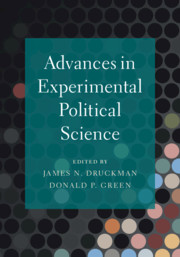Book contents
- Frontmatter
- Contents
- List of Figures
- List of Tables
- List of Boxes
- List of Contributors
- Acknowledgements
- 1 A New Era of Experimental Political Science
- Part I Experimental Designs
- Part II Experimental Data
- 8 Experiments, Political Elites, and Political Institutions
- 9 Convenience Samples in Political Science Experiments
- 10 Experiments Using Social Media Data
- 11 How to Form Organizational Partnerships to Run Experiments
- Part III Experimental Treatments and Measures
- Part IV Experimental Analys is and Presentation
- Part V Experimental Reliability and Generalizability
- Part VI Using Experiments to study Identity
- Part VII Using Experiments to Study Government Actions
- Author Index
- Subject Index
10 - Experiments Using Social Media Data
from Part II - Experimental Data
Published online by Cambridge University Press: 08 March 2021
- Frontmatter
- Contents
- List of Figures
- List of Tables
- List of Boxes
- List of Contributors
- Acknowledgements
- 1 A New Era of Experimental Political Science
- Part I Experimental Designs
- Part II Experimental Data
- 8 Experiments, Political Elites, and Political Institutions
- 9 Convenience Samples in Political Science Experiments
- 10 Experiments Using Social Media Data
- 11 How to Form Organizational Partnerships to Run Experiments
- Part III Experimental Treatments and Measures
- Part IV Experimental Analys is and Presentation
- Part V Experimental Reliability and Generalizability
- Part VI Using Experiments to study Identity
- Part VII Using Experiments to Study Government Actions
- Author Index
- Subject Index
Summary
Widespread use of social media platforms has generated an explosion of data available for use by political scientists. This chapter will outline the possibilities of social media data for experimental research in all domains. At a basic level, social media data can be useful for improving measurement and design in the study of classic theories. It also facilitates research into questions about politics and the internet itself. Using a large Twitter field experiment as a running example, I will illustrate how social media platforms can be used to (1) recruit experimental subjects, (2) deliver treatments, and (3) collect outcomes. I suggest that these possibilities are especially promising for scholars interested in studying political mobilization and media effects. Finally, I discuss challenges and opportunities for using these techniques to explore peer effects and other network dynamics.
- Type
- Chapter
- Information
- Advances in Experimental Political Science , pp. 184 - 198Publisher: Cambridge University PressPrint publication year: 2021
- 5
- Cited by



